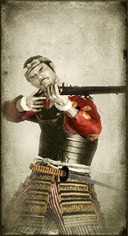
Basic Unit Statistics (can be modified by difficulty level, arts, skills, traits and retainers)
| Recruitment Cost | 570 | |
| Upkeep Cost | 80 | |
| Melee Attack | 6 | 17% |
| Charge Bonus | 6 | 12% |
| Bonus vs Cavalry | 0 | 0% |
| Range | 100 | 15% |
| Accuracy | 25 | 25% |
| Reloading Skill | 25 | 25% |
| Ammunition | 15 | 18% |
| Melee Defence | 2 | 5% |
| Armour | 4 | 26% |
| Morale | 7 | 14% |
Strengths & Weaknesses
- Average accuracy and slow reload rate.
- Weak in melee.
- Weak against cavalry.
- Weak against rifles.
- Average morale.
Requires
Description
These warriors carry muskets capable of massed volleys that inflict great damage.
War is changing and those who stubbornly cling only to the old ways will surely perish. All armies require the firepower these musket-armed troops offer. Their accuracy makes them ideal for breaking enemy charges and providing support for the main line of troops. They should never be sent into melee combat, and their slow reload times leave them vulnerable to cavalry attacks. In ranged combat they will be outmatched by units with more modern firearms. Muskets were originally introduced into Japan by Portuguese traders in the 1500s. These weapons were bought, copied, improved and then remained the standard Japanese firearm for years after. Despite the availability of better weapons from overseas, it was still not unusual to find armies using designs that were hundreds of years old and "native" rather than "foreign". The matchlock had the advantage of being simple, quite rugged in operational conditions, and its use was well understood by men, officers and generals. To be fair to the Japanese, who might appear a little hidebound by their use of the matchlock, during the 19th Century many European armies had been strangely reluctant to abandon the familiar flintlock in favour of the new-fangled percussion cap.
